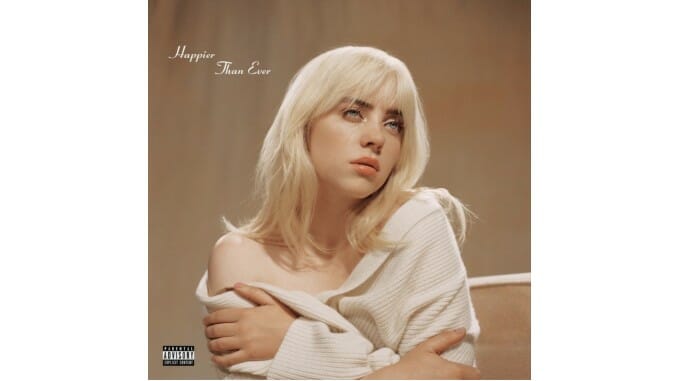Billie Eilish Confronts Her Intense Rise to Stardom with Self-Compassion on Happier Than Ever

There’s little reason to envy the superstars of today. In an age where every visible action or unintended double entendre is subject to intense scrutiny by the blood-starved, surveillance-like drones of internet fandom, whose brains’ pleasure centers have been deep-fried by overstimulation in conjunction with a global pandemic, it would seem that no matter what you do, you’re making somebody very, very upset. If you’re pop singer/songwriter Billie Eilish, you’ve spent much of your short but impactful time in the public eye battling the vitriolic gaze of those who judge you and your image, rather than your art.
After her landmark debut When We All Fall Asleep, Where Do We Go? placed the artist in superstar territory, she was met immediately with the warm embrace and cold, unrelenting reality of fame—seeds of salacious rumors about her past relationships and allegations of wrongdoing in her personal life were sown along the lead-up to her highly anticipated Happier Than Ever. Despite the tremendous pressure, Eilish sounds forthright, level-headed and often funny on an album that marks a clear progression for the artist—sacrificing some of the playfulness that defined her debut in favor of an honest, unflinching display of self-compassion, sensuality and strength.
Another collaboration with Eilish’s brother, songwriter/producer FINNEAS, Happier Than Ever maintains the duo’s rare skill for crafting tight, glossy tracks that sound simultaneously like the sentimental warmth of bedroom pop and the ambitious sheen of the studio. Opener “Getting Older” sets the stage for the sonic landscape of the album quickly: minimalist beats with sparse, chord-based instrumentals that often serve as a platform on which Billie can utilize her inimitable voice alongside imaginative, charming and often confrontational lyrics. “Getting Older” wrestles with the complexities—good, bad and scary—that arise after one achieves a certain level of fame. Somberly, she sings about how “things I once enjoyed / just keep me employed now” while painting mental pictures of “deranged strangers,” with both a solemn understanding of and appreciation for the situation.
Stepping away from the often-cartoonish pop that characterized her debut, Happier Than Ever is evocative of several eras of music, ranging from the consistent aesthetic influence of 1950s and ‘60s “Golden Age” artists like Peggy Lee and Julie London to the neo-soul hits of the late ‘90s and early 2000s, like on the effortlessly suave “Billie Bossa Nova,” or “I Didn’t Change My Number.” “GOLDWING,” one of the album’s most dreamlike and unique songs, begins with an a cappella intro that develops into harmonies, sounding almost hymnal and devotional before silence and a drum beat carries the track into familiar Eilish pop territory. Regardless of what style she’s inhabiting, she delivers her catchy and effective melodies with an emotional arc, lending an extra dynamic layer to the work.
-

-

-

-

-

-

-

-

-

-

-

-

-

-

-

-

-

-

-

-

-

-

-

-

-

-

-

-

-

-

-

-

-

-

-

-

-

-

-

-








































